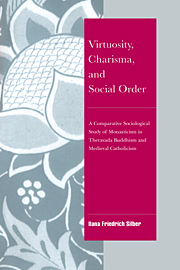 Virtuosity, Charisma and Social Order
Virtuosity, Charisma and Social Order Book contents
- Frontmatter
- Contents
- Preface
- Introduction
- Part I Virtuosi and society: elements of a comparative macrosociological approach
- Part II Virtuosi and society in Theravada Buddhism
- Part III Virtuosi and society in medieval Catholicism
- 6 Ideological groundings: plurality and conditional exchange
- 7 Virtuosity institutionalized: monasticism in social context
- 8 Virtuoso radicalism: a self-defeating triumph
- Part IV Virtuosity, charisma, and social order
- Conclusion: Religious virtuosity as ideological power: some implications for the comparative study of civilizations
- Bibliography
- Index
6 - Ideological groundings: plurality and conditional exchange
Published online by Cambridge University Press: 09 October 2009
- Frontmatter
- Contents
- Preface
- Introduction
- Part I Virtuosi and society: elements of a comparative macrosociological approach
- Part II Virtuosi and society in Theravada Buddhism
- Part III Virtuosi and society in medieval Catholicism
- 6 Ideological groundings: plurality and conditional exchange
- 7 Virtuosity institutionalized: monasticism in social context
- 8 Virtuoso radicalism: a self-defeating triumph
- Part IV Virtuosity, charisma, and social order
- Conclusion: Religious virtuosity as ideological power: some implications for the comparative study of civilizations
- Bibliography
- Index
Summary
When we examine the ideological premises of virtuosity and of the virtuoso–society relation in Western Christianity, the overriding fact, in contrast to Theravada Buddhism, is how ambiguous the doctrinal status of monasticism originally was. Undeniably, the Gospels include both a powerful world-rejecting strand and very strong “virtuoso orientations,” that is, orientations encouraging the emergence of religious rigorism and perfectionism. However, neither monasticism itself nor a definite, specific pattern of interaction with the laity enjoyed unequivocal doctrinal anchoring. Much of the ambiguity in the theological status of monasticism may be traced to a Christian mode of managing the tension between otherworldly and worldly orientations very different from that characteristic of Theravada Buddhism. As we shall see, in fact, Christianity may even be said to pose serious obstacles to the type of virtuoso–society relation found in Theravada Buddhism.
Notwithstanding the doctrinal ambiguities and obstacles, monastic life did come to represent the foremost ideal and the surest way to salvation for many Christians. The relationship between virtuosi and the rest of the Church gradually received ideological articulation. Underpinning this ideological incorporation of monasticism, however, was a conception of the Christian collective, and of religious authority, that has no equivalent in canonical Buddhism and can even be said to go against its grain.
- Type
- Chapter
- Information
- Virtuosity, Charisma and Social OrderA Comparative Sociological Study of Monasticism in Theravada Buddhism and Medieval Catholicism, pp. 119 - 136Publisher: Cambridge University PressPrint publication year: 1995
